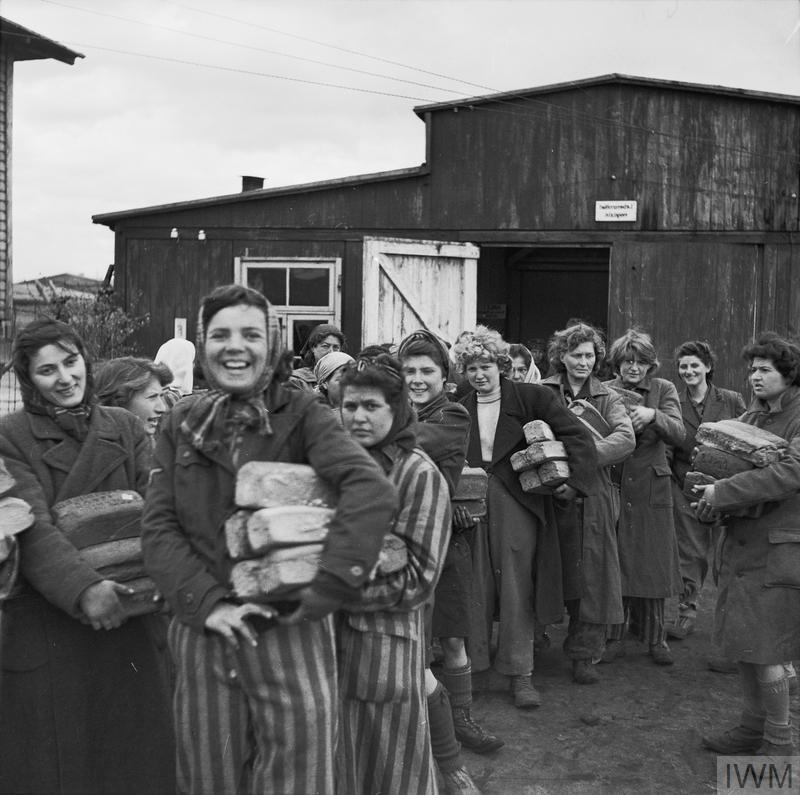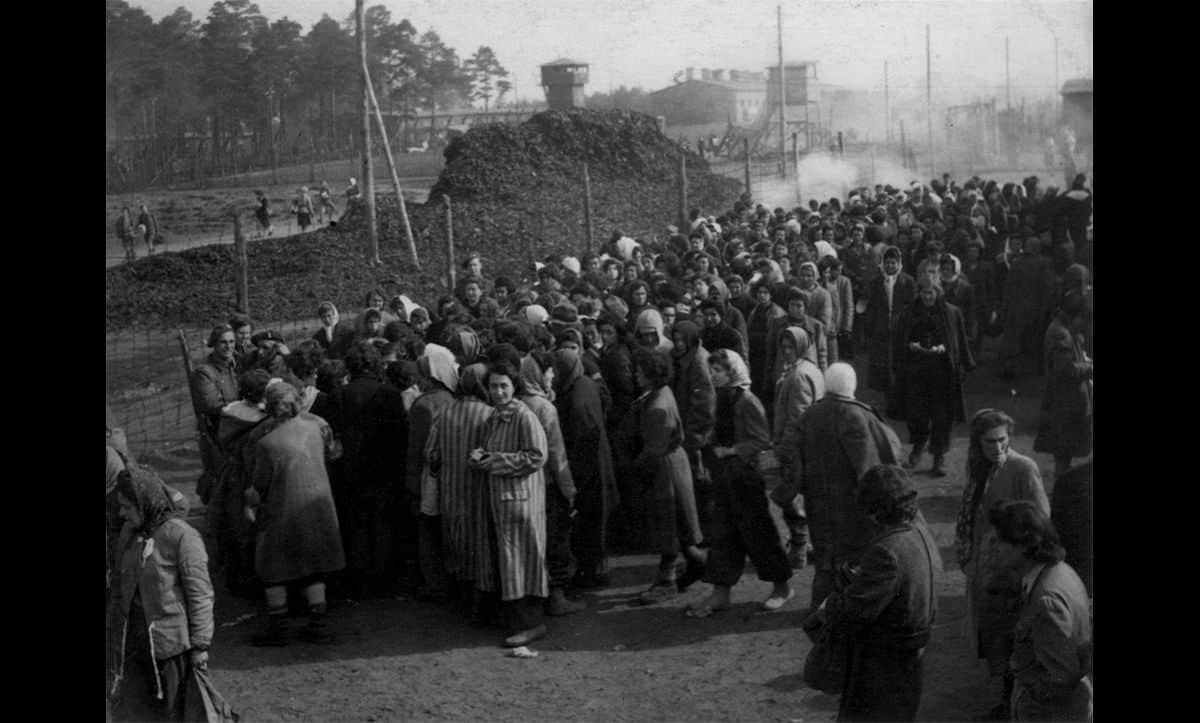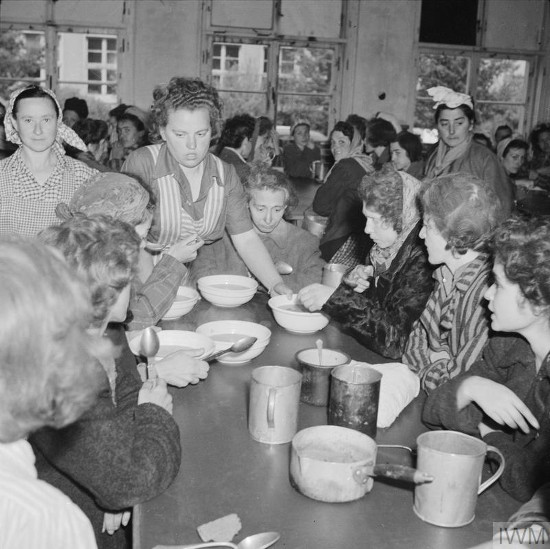The Bread He Broke — Bergen-Belsen, 1945
When the gates of Bergen-Belsen were finally opened in April 1945, silence did not roar with joy. Instead, it whispered through the barracks, a silence broken only by the ragged breathing of those who had somehow survived. Liberation did not feel like triumph—it felt like the sudden lifting of a suffocating weight, leaving behind bodies too frail to carry the burden of freedom.
Among those liberated was a man whose name history did not record, but whose final act of kindness etched itself into memory forever. Emaciated, his bones protruding through thin skin, he was given a piece of bread. It was the first real nourishment he had seen in weeks. Yet instead of devouring it, instead of claiming survival for himself, he broke it into three fragile portions and handed them to the weaker prisoners beside him. Hours later, he lay down, closed his eyes, and never opened them again.
The two who received his bread lived. Decades later, they recounted his sacrifice, whispering through tears:
“His kindness was the reason we survived.”
Bread. A single piece—hard, stale, perhaps smaller than the palm of a hand. In Bergen-Belsen, it was more than food; it was life, hope, a spark against the dark abyss. When the man broke his bread, he shattered not only the rules of survival in the camp but also revealed a truth that echoes across generations: in the face of despair, humanity is defined not by what we take, but by what we give.
This single act of sacrifice invites us to reflect on the value of compassion in our own lives. We may live in an age of abundance—credit cards in our wallets, mortgage plans for our homes, investments shaping our futures, health insurance securing our well-being—but the question remains: what do we do with what we have?
To understand the power of that moment, one must step into the bleak world of Bergen-Belsen in 1945. Originally established as a prisoner-of-war camp, it transformed into a concentration camp where starvation, typhus, and exhaustion consumed thousands daily. Piles of corpses grew faster than they could be buried. Survivors were living skeletons, barely recognizable as human beings.
For many, the act of holding onto a crust of bread meant the difference between life and death. To give that bread away was unthinkable. Yet one man thought differently. In doing so, he restored a shred of dignity to a world designed to strip it away.
We often measure success in modern life by the size of our homes, the growth of our investments, the strength of our retirement plans, or the limit of our credit cards. But in that barrack in Bergen-Belsen, success was measured in heartbeats, in the simple ability to breathe one more day.
This man’s sacrifice challenges us to reexamine what truly matters. His act was not about grand gestures, not about financial strategies or personal loans—it was about love in its purest form: giving when there is nothing left to give.
When we compare that moment with the choices we face today—whether it’s taking out a mortgage, securing life insurance for our families, or enrolling in the best online degree to secure a future—we find a quiet reminder. Wealth, security, and education are vital, but they mean little without compassion.
The two prisoners who ate his bread carried his memory through the decades. They survived the camp, rebuilt their lives, raised families, and shared his story. They may have bought homes, paid off mortgages, taken out health insurance, and built credit histories—but at the core of their survival was one nameless man who had nothing yet gave everything.
They would often say: “His kindness was the reason we survived.”
We live in a time where generosity can be as small as helping someone navigate a personal loan, guiding a student toward the best online degree program, or teaching a family how to invest wisely. These acts may not be as dramatic as sharing bread in Bergen-Belsen, but they echo the same principle: helping others endure, helping others thrive.
The world today is unrecognizable compared to 1945, yet the moral landscape still asks the same question: How will you use what you have to serve others?
-
If you are blessed with wealth, investments, or property, how will you share them?
-
If you hold knowledge, perhaps gained through an online degree or years of experience, will you mentor those who come after you?
-
If you have the stability of health insurance, life insurance, or auto insurance, will you advocate for those who go without?
Survival in our modern world may not depend on a piece of bread, but it still depends on kindness. Financial systems—mortgage lenders, credit card companies, personal loan providers—can easily dehumanize us. Yet compassion humanizes every transaction, turning cold numbers into lifelines.
Stories like this are not merely history lessons; they are moral compasses. In remembering the man at Bergen-Belsen, we resist the temptation to define our lives only by profit margins and return on investment. Instead, we redefine wealth as generosity, courage, and sacrifice.
When we take out life insurance, we are not just buying a policy—we are protecting the people we love. When we invest, we are not only seeking financial return—we are planting seeds for generations. When we pay a mortgage, we are not only building equity—we are building a home. And when we extend kindness, even in small amounts, we are continuing the legacy of the nameless man who shared his bread.
The story of Bergen-Belsen is not easy to hear. It is not meant to comfort but to awaken. To awaken us to the fragility of life, the necessity of empathy, and the possibility of hope even in the darkest places.
Think of it: one act of compassion in a concentration camp echoes into our present, influencing how we view health insurance, credit cards, investments, and online degrees. These are the tools of survival in our age. But without kindness, they are hollow.
The bread he broke did not just sustain two starving men—it sustained humanity.
The nameless man in Bergen-Belsen did not live to see freedom. He never rebuilt a home, never took out a mortgage, never held a credit card, never opened an investment portfolio, never secured health insurance, never graduated with an online degree. Yet his life left a legacy more powerful than any of these.
Today, we have opportunities he never had. We can protect our families with life insurance. We can grow wealth through wise investments. We can earn online degrees to build our careers. We can travel, study, and dream. But in the end, the question remains:
What will you break to give to others?
A piece of bread in 1945 was enough to save two lives. What is the bread in your hands today—your resources, your time, your compassion—and who will survive because you shared it?
The story of the man in Bergen-Belsen is not just a relic of history. It is a living challenge. In a world where we measure security by credit cards, mortgages, investments, personal loans, and insurance policies, his act reminds us that true security lies in human kindness.
He gave everything he had—one piece of bread. And because of it, two men lived, and we are still telling his story nearly eighty years later.
His kindness was the reason they survived. May our kindness be the reason someone else does, too.
Note: Some content was generated using AI tools (ChatGPT) and edited by the author for creativity and suitability for historical illustration purposes.





Leave a Reply